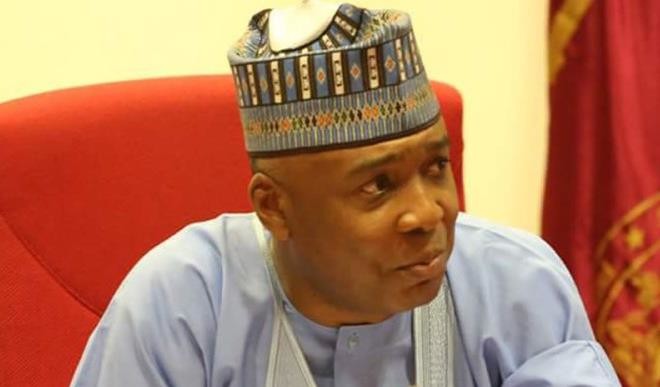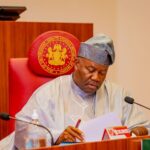As crude oil price dropped to $50 per barrel in the international market, the Senate President, Dr. Bukola Saraki, has expressed worry that implementing the 2019 budget might be problematic with the federal government proposing a benchmark of $60 per barrel in the 2019 Appropriation Bill that President Muhammadu Buhari submitted to the National Assembly.
In a chat on Thursday with a select group of editors at the Murtala Muhammed International Airport, Lagos, Dr. Saraki speaks on what President Muhammadu Buhari has not been doing on budget planning, and why the budget has been difficult to implement.
—————————————————————————————————————————————–
DT: Oil price has dropped sharply far below the $60 per barrel that is the benchmark for the 2019 budget proposal. How would that affect budget implementation in 2019 if the price remains below that benchmark?
Saraki: I have commented that the 2019 budget proposal is a hopeless budget that will really not bring Nigerians out of poverty and bring about diversification of the economy and inclusive growth. When I said that, a lot of people went on the defensive and felt it was just politics.
No. I am responsible enough to choose my words right. I have seen budgets under this administration and I have never used a word as strong as that. Concerning budgets, some had given hope, some had tried to address problems, but this particular one, I stick to my word, doesn’t give any hope. More importantly, the budget is deceptive.
Look at the oil price; you have not even completed the budget exercise and crude oil price has dropped well below the benchmark. You are using a benchmark higher than the prevailing oil price. Who does that? To project the oil price at $60 per barrel is not realistic. Those in government should know that that benchmark cannot fly.
It’s not only the price, look also at the production level. In 2017, 2018, we were doing about 1.9 million barrels per day, but the 2019 budget proposal is 2.3, so what is going to change? Again, that is too ambitious, so if you are basing your revenue projection on that and you can’t do up to that, there is already a big hole.
I have been Special Adviser, Budget, in the Presidency, so I can talk from experience that those numbers won’t fly.
What is even more disturbing is that looking at total expenditure, over 70 percent is going for recurrent, especially debt servicing and personnel. So it is clear that any shortfall in revenue would be very impactful. Once we can’t hit the targets in crude oil benchmark and production level, we are going to have a huge deficit.
DT: Budgeting generally seems to be a major challenge for government: delays, controversies, etc. What would you say is the problem?
Saraki: I believe it has to do with unrealistic targets and assumptions. The President has to take charge directly. You can’t leave budget planning to technocrats with their unrealistic targets and assumptions.
Again, there is need for more consultation at the political leadership level between the Executive and the National Assembly. The President needs to sit down with the Senate and House of Representatives leaders and say, ‘look, this is what my technical people have brought to me’, and issues there will be trashed out. So, by the time the budget gets to the National Assembly and the public domain, it is a document that is truly owned by both, not one just owned by only the Executive or the National Assembly.
Such a consultation limits the back and forth on the document. What’s happening now is that a lot of work that should be done behind the scene showing consultation and ownership is not done. So when the Appropriation Bill gets to the National Assembly, it is as if work on it is just starting all over again. Don’t forget, we have constitutional powers to do our work.
But if there is adequate consultation, by the time it comes to the National Assembly, it would be short work on it because the principles would have been agreed, the general framework would have been done and it’s just details and minor adjustments that the legislators would work on. If there is no dialogue prior to budget presentation by the President, we are going to be having this kind of issues.
If the necessary consultation with the National Assembly leaderships is done, even if the President presents the budget in the second week of December after, there would be no issues. Look at states as good examples. I had been a state governor. Before I presented my budget, the entire House of Assembly members would have been consulted.
Whatever their concerns I knew and had already been incorporated in the budget. They are stakeholders. The American system of government that we practise emphasises dialogue. It’s not a personality issue: once the style and the approach do not change, there will always be problems.
DT: What’s the problem with implementation?
Saraki: Funding. Take independent revenue, which has been underperforming from day one of this administration. The President’s men keep giving him an independent revenue that is not realistic – N800 billion, N900 billion. But look at implementation and it is N150bn, N200bn. There are still too many leakages. In a government saying it is fighting corruption, the level of leakages is still huge. You have a budgetary projection of N900bn and your men are submitting an independent revenue of N200bn. That shortfall of N700bn can’t allow a faithful implementation of the budget.
First charge will go to personnel. Like at this budget now, personnel will take about N2.3 trillion. That’s gone. Debt servicing will take like another N2trn. That’s also gone. Then overheads, another high sum like that. About N6trn is gone. It’s the little money remaining after all that that will be squeezed out for capital expenditure. So once you’ve gotten your revenue projection wrong, implementation becomes a problem.
What’s even more frightening now is that the deficit is so huge that a greater part of the borrowing in 2019 will go for recurrent. And that’s even against the law; borrowing is only meant for capital expenditure. But because the revenues are low, there is implementation problem.
The major issue really is that of revenue. You must plug the leakages. So long you don’t plug the leakages, you will have no implementation, you will break the law and there will be no investment infrastructure. And without investment infrastructure, there can’t be the leverage to address poverty, so where is the hope?
We should not be sentimental about this. When there is an important message that affects all of us, instead at looking carefully at the message, we attack the messenger.
Opaque subsidy management is another source of leakage. At least, finally now, the President is doing something right, to an extent, on oil subsidy. I have shouted many times that oil subsidy should come in as a budget line. The NNPC was blowing an illegality on it, calling it cost recovery. What is cost recovery? That is an illegality. All we’ve had was opaqueness, and that wasn’t efficient. That is another source of leakage. If the subsidy management is efficient, we will have money. But if it otherwise, we will be losing money that should be coming into the federation account. The reality now is that there is no money.
DT: You said there is no money. So do you have any fear government could be borrowing more next year?
Saraki: As they say, if you borrow well and you borrow for infrastructure development, there is no problem. But our borrowing here, I am sure part of it goes for recurrent because of the huge deficit. But should we be borrowing at all? Again, the constant shortfall in revenue. If our revenues are up, instead of doing N150bn but we are doing N700bn in independent revenue and all lines of leakages are blocked, borrowings will fall.
They always say the cost of borrowing to our GDP ratio is low, but if you look at the percentage of servicing to revenue, it’s quite high.

 Join Daily Trust WhatsApp Community For Quick Access To News and Happenings Around You.
Join Daily Trust WhatsApp Community For Quick Access To News and Happenings Around You.


